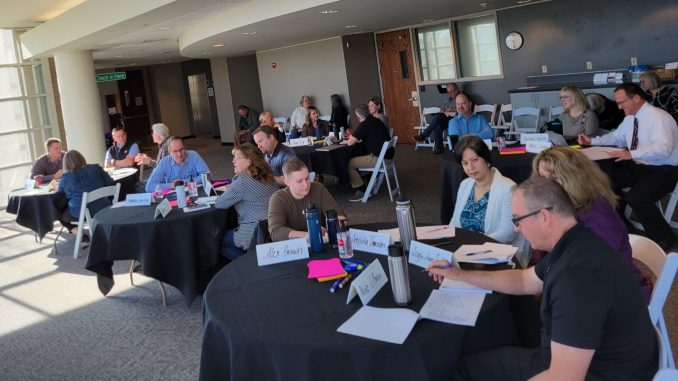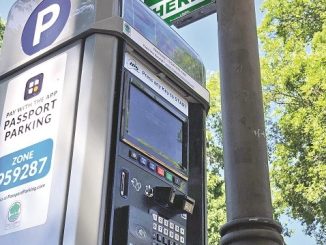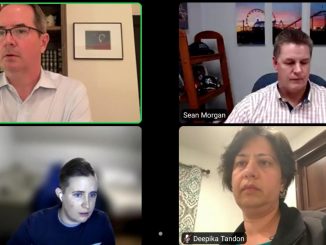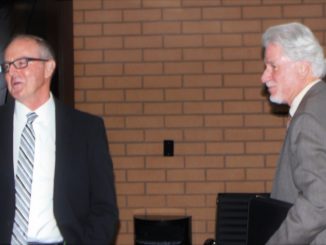
Last fall, after a postponement from a busy summer meeting, the Chico City Council resumed a strategic planning process that started in 2019. Newly hired Deputy City Manager Jennifer Macarthy picked up the project and presented vision statements drafted for issues designated as priorities for the city.
Those points, not ordered by priority, were: underserved populations; economic development; sustainability; transparency and communication; public safety; infrastucture; housing; and balanced budget. Macarthy intended to continue moving forward by facilitating the council’s confirmation and prioritization of the vision statements, enabling city staff to develop action items linked directly to these overarching objectives of the council.
That didn’t happen. Council members voiced disagreement with certain statements and inheriting a list created by a different group. Councilwoman Alex Brown (then vice mayor), Councilman Sean Morgan and Vice Mayor Kasey Reynolds are the carryovers from the 2019-20 council, which had a 5-2 progressive majority; conservatives now hold a 6-1 majority.
So, the council decided to start over—tabling the strategic planning item until staff could schedule a standalone workshop. This took place Friday (Feb. 25) in a day session at City Hall, where a dozen members of the public watched the seven, clustered at tables with city department heads, flesh out their own set of vision statements.
The results closely mirrored the previous batch, with notable exceptions. Absent were serving vulnerable residents (apart from acknowledging homelessness as a component of housing) and responding to environmental impacts (apart from parks and waterways as quality of life)—i.e., the vision statements that drew comments at that Oct. 19 meeting.
This council arrived at, in no set order: quality of life, public safety, economic development, infrastructure, housing and budget. Subsequent work elicited: responsible growth, staff employment, city culture, public communication, priority-driven decision-making and collaborative advocacy at higher levels of government. Spurred by feedback from Morgan, who noted the previous stall-out at this spot, the council asked for a follow-up session as soon as possible with facilitator Scott Winter, the Chicoan who led Friday’s workshop.
“I don’t disregard the value of the process we went through today,” Brown told the CN&R afterward. “However, I think that we’re landing in very similar places that the previous process led us through, and this was more of a statement about certain priorities being atop of this council makeup’s list than it is about letting our process and our values dictate the outcome.
“I was a little bit concerned to hear certain council members hear that we need to make a list of certain things that we’re going to focus on [priority-based decisions] because I heard that in the first process, and the thing I fear is that new ideas will not be welcomed and new ideas will be thrown out because of a perception that they don’t align, and the healthy debate that should be driving the public policy-making process could be thwarted and harmed.”
Reynolds told the CN&R she was happy with the “first step” of a strategic plan on which the council “has a lot more work to do”—and also should not carve in stone.
“[Strategic planning] is something we need to do continually, on a regular basis, and [not] something we just do every two years,” she continued. “We need to ingrain it as part of the natural work we do as a council and a community, and make sure the community is involved as well.”
Six of the public attendees, whose input consisted of a comment period at the end, spoke to the council on specific concerns: affordable housing, homelessness, growth, water, climate change, finances and public participation.
“The conversation that led to us redoing this entire process had to do primarily with two facets of the previous process,” Brown said, “which was serving underserved populations and addressing environmental concerns, which should be at the top of every single city’s priorties list regardless of your political affiliation because the realities of climate change and the realities of low-income populations, and the barriers that they face to accessing government and resources, are demonstrable. So to try to find a way around addressing those things is irresponsible, plain and simple.
“I’m not unhappy with the result of some of these conversations or with the higher-level conversations that might drive them, like intentionality or research-informed decision-making … I think all of those things are appropriate to assign to a process. It’s when you discard things that don’t apply with your values that it becomes problematic, and I’m concerned based on some of the things I’ve heard said today that that could be the direction that we’re going.”
Reynolds, among the three carryovers, said a fresh start made more sense than “trying to augment something that hasn’t been looked at for three years and the majority of the people in the room weren’t involved [with] … it’s just easier to start from the beginning, start over and just move forward.
“And I don’t think there was a huge amount of change. I mean, I have the pictures from the old stuff that we looked at—it’s a lot of the same recurring themes. The city hasn’t changed much; we have a lot of the same issues, so I don’t feel it’s polar opposites of items.”




Browns complaints mirror what Brown and the Council have done with my e-mails to them Case presented at last council meeting.. No replies and no reason for not replying. Brown and and her fellow hypocrite’s are wasting public dollars and time. Their views do not reflect their action. Why bother reporting on someone who chooses not to reply to voters request for action on a valid legal point? You have to be able to listen to the public and respond to them in order to make public policy. Brown talks the talk but doesn’t walk the walk. Just like Browns fellow council members. Forget the fake progressive label and the lawlessness and rules for others council majority.
Huber, no longer on council, and Brown are the only council members to ever respond to my emails. None of the current majority ever respond to outreach.
Reynolds actually asked me NOT to comment on her city council Facebook page. Not exactly welcoming or approachable elected officials for anyone but their crowd.
Our council is ran like a bad middle school clique without regard for larger community concerns for those seriously impacted by the economy and policy. There is a serious disconnect with the majority of the population.